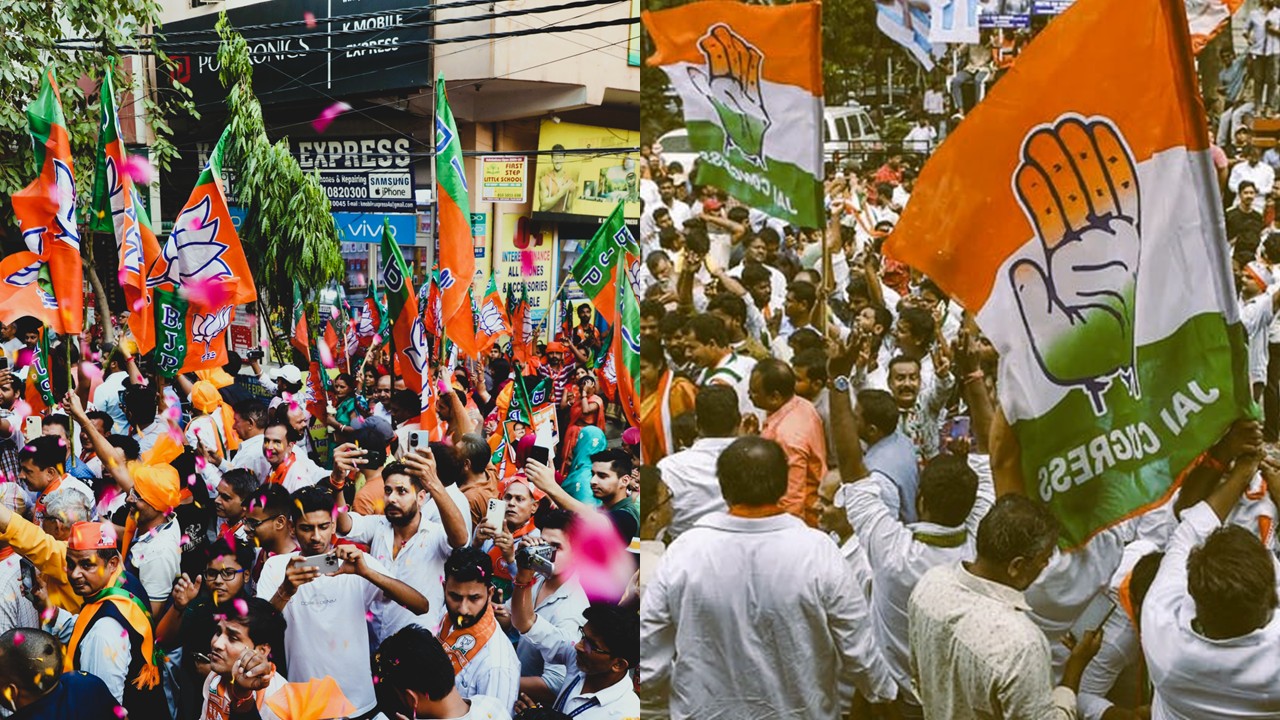Party-wise data showed that of the 336 BJP ministers, 136 (40 per cent) declared criminal cases, while 88 (26 per cent) are facing serious offences.

Representative image of BJP (left) and Congress rallies. Photos sourced from X.
Nearly half of India’s ministers have declared criminal cases against themselves, including grave charges such as murder, kidnapping, and crimes against women, according to an analysis released by the poll rights body Association for Democratic Reforms (ADR).
The findings come just days after the Centre introduced three bills seeking the removal of prime ministers, chief ministers, and ministers if arrested for 30 days on serious criminal charges, news agency PTI reported.
ADR’s study examined self-sworn affidavits of 643 ministers from 27 state assemblies, three Union Territories, and the Union Council of Ministers.
The analysis revealed that 302 ministers, or 47 per cent of the total, have criminal cases pending against them, with 174 facing serious charges.
Party-wise data showed that of the 336 BJP ministers, 136 (40 per cent) declared criminal cases, while 88 (26 per cent) are facing serious offences.
Among Congress ministers, 45 of 61 (74 per cent) reported criminal cases, including 18 (30 per cent) with serious allegations. The DMK had one of the highest shares, with 27 of its 31 ministers (87 per cent) facing cases, 14 of whom (45 per cent) face serious charges. In West Bengal, 13 of Trinamool Congress’s 40 ministers (33 per cent) had cases, eight of which (20 per cent) were serious.
The Telugu Desam Party (TDP) topped the list with 22 of its 23 ministers (96 per cent) declaring criminal cases, including 13 (57 per cent) booked under serious charges. Among AAP’s 16 ministers, 11 (69 per cent) reported criminal cases and five (31 per cent) declared serious ones. At the national level, 29 of the 72 Union Council ministers (40 per cent) admitted to criminal cases in their affidavits.
State-level analysis showed that 11 assemblies—Andhra Pradesh, Tamil Nadu, Bihar, Odisha, Maharashtra, Karnataka, Punjab, Telangana, Himachal Pradesh, Delhi and Puducherry—have over 60 per cent of their ministers with criminal cases. In contrast, Haryana, Jammu and Kashmir, Nagaland, and Uttarakhand reported none.
Alongside its criminal background study, ADR also assessed the financial assets of ministers. The average wealth of ministers stood at Rs 37.21 crore, with the collective assets of all 643 ministers amounting to Rs 23,929 crore. Eleven assemblies have billionaire ministers, led by Karnataka with eight, followed by Andhra Pradesh with six and Maharashtra with four, reported PTI.
Other states with billionaire ministers include Arunachal Pradesh, Delhi, Haryana, Telangana, Gujarat, Himachal Pradesh, Madhya Pradesh, and Punjab.
At the Centre, six of the 72 Union ministers (8 per cent) were billionaires. By party, BJP had the highest number of billionaire ministers at 14, though just 4 per cent of its total strength. The Congress followed with 11 (18 per cent), while the TDP had six billionaire ministers, making up 26 per cent of its total. Ministers from AAP, Janasena, JD(S), NCP, and Shiv Sena also featured in the billionaire list.
The richest minister in the country is Dr. Chandra Sekhar Pemmasani of the TDP, representing Andhra Pradesh’s Guntur in the Lok Sabha, who declared assets worth over Rs 5,705 crore. He is followed by Karnataka Congress leader and minister D.K. Shivakumar, with assets exceeding Rs 1,413 crore, and Andhra Pradesh Chief Minister N. Chandrababu Naidu, with over Rs 931 crore.
Others in the top 10 include Narayana Ponguru and Nara Lokesh from Andhra Pradesh, Gaddam Vivekanand and Ponguleti Srinivasa Reddy from Telangana, Suresha B.S. from Karnataka, Mangal Prabhat Lodha from Maharashtra, and Union Minister Jyotiraditya Scindia.
On the other end of the spectrum, some ministers reported extremely modest wealth. Sukla Charan Noatia of the Indigenous Peoples Front of Tripura declared assets of just Rs 2 lakh, while West Bengal minister Birbaha Hansda of the Trinamool Congress reported assets of a little over Rs 3 lakh.
ADR noted that the status of these criminal cases may have changed since the affidavits were filed with the Election Commission during elections held between 2020 and 2025.

